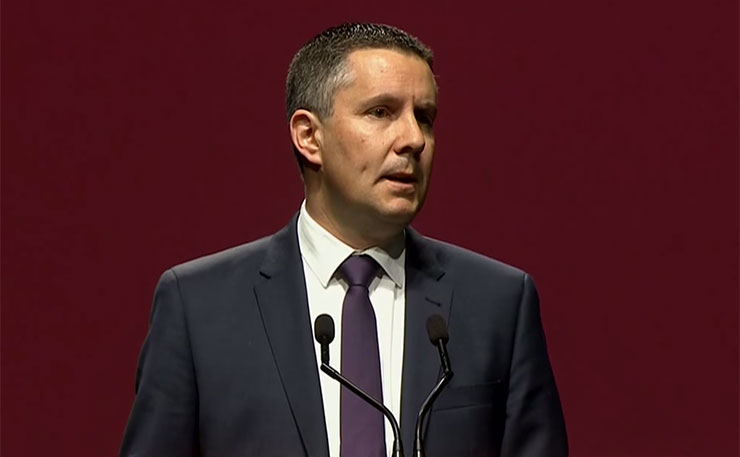ANALYSIS: Labor has unveiled its major policy for dealing with climate change and helping Australia move away from a carbon intensive economy. While obviously superior to the Coalition’s position, an inconvenient truth remains. This won’t be enough, writes Ben Eltham.
One of the challenges about covering federal politics is that you often need to explain policies and party positions that are quite detached from reality.
The things politicians say sometimes have little relationship with the world around us.
Take climate change, for instance. On any analysis, it is the single most important issue the world must come to terms with. Our planet is rapidly warming because industry is spewing toxic gas into the atmosphere. Any sensible government would address this by forcing industry to stop polluting.
But in Australia in 2016, the government doesn’t do this. Despite record high temperatures and the Great Barrier Reef turning white, if you own a big dirty power station in this country you can belch as much carbon dioxide into the atmosphere as you like.
The reason, of course, is politics. Over the past decade, carbon has been a wicked problem like no other. Politicians from both major parties have tried and failed to come to grips with it.
The dismal situation is well known. Tony Abbott’s Coalition spent years systematically destroying public support for action on climate change. After dismantling Labor’s carbon policy, the Coalition now runs an economy that is getting dirtier. Emissions are up. Temperatures are up. Renewable investment is down. The Great Barrier Reef is dying. And we’re still digging up coal.
In contrast to the Coalition’s craven opportunism, Labor has long endeavoured to do the right thing in carbon policy. The ALP spent much of its six years in office between 2007 and 2013 painstakingly developing and implementing a credible emissions reduction policy, in the form of an emissions trading scheme. It worked too: emissions went down from 2012 to 2014 while the ETS was in operation.
But Labor paid a heavy political price for its environmental diligence. The relentless attacks from Tony Abbott about the “great big new tax on everything” played a material part in the enduring unpopularity of the Gillard government, as did the catastrophic decision by Gillard to backflip on the introduction of a carbon tax.
So Labor was forced with a real dilemma on climate change going into the 2016 election campaign. Should it go big, and promise a serious carbon reduction policy? Or should it opt for the tried and true small target strategy of most oppositions?
We found out the answer yesterday, with the release of Labor’s latest carbon policy.
In an effort to do something about pollution but avoid the dreaded phrase “carbon tax”, Labor has crafted a clever political compromise.
The ALP’s relatively ambitious emissions reduction target of 45 per cent by 2030 is retained, but the dreaded words “carbon permits” are out. Not only is there no tax, there isn’t even a price – not an overt one, at any rate. And instead of a comprehensive emissions trading scheme that covers most of the economy, Labor has plumped for a two-phase ETS that will cover only power generation initially. There are some smaller scale complementary measures in there too, like cracking down on land clearing, electricity market reform, more money for community power schemes and a promise to keep ARENA, the Clean Energy Finance Corporation and the Climate Change Authority.
In addition, there is a 50 per cent target for renewable energy, probably achieved via reverse auctions, following the successful experiments of the Australian Capital Territory. The idea here appears to be to avoid using the Renewable Energy Target, which was so successfully sabotaged by the Abbott government under Greg Hunt and Ian Macfarlane.
One of the most interesting aspects of the package is its commitment to a “just transition” out of carbon-intensive industries. There will be a policy to manage the retirement of coal-fired electricity plants and packages to retrain workers. This addresses concerns within powerful unions like the CFMEU about the effects on employment of decarbonisation.

Labor has definitely done its homework. Environment spokesman Mark Butler has put together a well-crafted policy that should still achieve meaningful emissions reductions, if there is a Labor government to implement it. The party has released a detailed six-point policy document explaining its intentions.
Is it enough? No, it’s not enough. Labor’s 2012 Clean Energy Future policy was much more comprehensive and better designed. So this is a step backwards. Meanwhile, as the world warms more quickly than anyone expected, the looming problems that climate change will impose on Australia keep getting bigger. There is little in the document about adapting to a warmer world.
And Labor has made some rather dangerous compromises that could back to haunt it. It has elected not to price carbon, instead simply mandating a cap and forcing big polluters to either reduce emissions or fund offsets. This allows Labor to say there is no carbon tax. But it also means Labor won’t raise any carbon revenue. That could prove expensive down the track.
If Labor had gone with a traditional carbon permit scheme, the revenue from carbon prices could have been used to fund hand-outs to voters, as well as to pay for the inevitable challenges of adaptation. These will be huge. Remember – global warming is coming anyway, even if the world finally gets its act together and limits the damage. The government will need hundreds of billions down the track to deal with it. Failing to collect carbon revenue is a big missed opportunity for the future.
Labor’s plan is also weak on carbon exports. The ALP continues to pretend that coal dug up in Australia and sent overseas is somehow not our problem – an insane denial that is simply unsustainable in the medium-term future. The age of coal is ending, and the coal industry needs a phase-out plan in the same manner as fossil-fuel power generation.
So the ALP’s carbon policy has some serious flaws. A full-scale ETS would be far preferable. Then again, anything is better than the Coalition’s current policy of “burn, baby, burn.” Labor can’t be faulted for a bit of caution in this policy space, given the traumas of the past five years.
What about the politics of the announcement? Labor has earned positive early coverage, and seems to have the cautious support of some environmentalists and business lobby groups.
The Coalition will undoubtedly launch a full-scale scare campaign on the policy, and already has attack advertisements ready. So the real question is whether the scare campaign will bite. Given the relatively muted impact of the actual carbon tax in 2012 and 2013, Labor may well be able to stare down the fear mongers on the sensible grounds that its policy will have little effect on electricity prices.
If so, Labor will have put in place another key milestone on its way to election day. But the problem of climate change is not going to magically disappear. Labor’s policy is still far short of what’s actually required, and that’s the real measure it should be assessed on.
Australia needs a Labor government if any progress on emissions is to be made. But a future Labor government will still find the politics of carbon extremely difficult.
Donate To New Matilda
New Matilda is a small, independent media outlet. We survive through reader contributions, and never losing a lawsuit. If you got something from this article, giving something back helps us to continue speaking truth to power. Every little bit counts.





